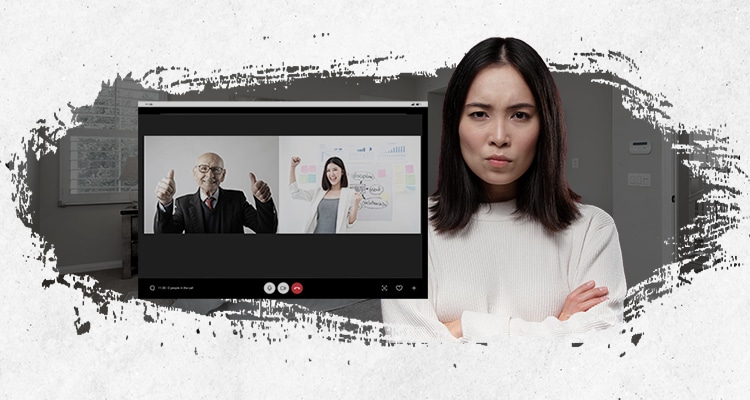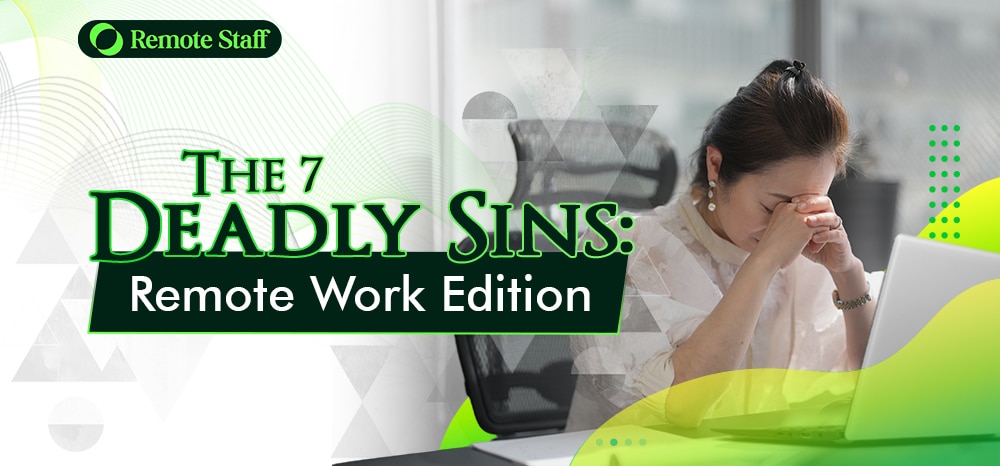One of the few upsides of the Covid pandemic is the growing popularity of work from home jobs.
Online jobs provided workers with better schedule flexibility and work-life balance, and also empowered people who had trouble landing traditional jobs, like Persons With Disabilities (PWDS), seniors, and single moms.
Unfortunately, some remote workers have taken these benefits for granted and consequently developed bad habits.
Fortunately, the Lenten season is the perfect time for self-reflection to correct these mistakes and improve your career.
To help you with this, here are the seven deadly sins of remote work – and how you can repent of them, so to speak.

Sloth
One of the most typical remote work deadly sins is sloth.
This often takes the form of procrastination due to the abundance of distractions in an online work from home setup and the absence of face to face supervision.
Another manifestation is the resistance to change.
For example, even after four years of remote work, some workers still haven’t figured out how to make the most of digital communication and collaboration tools like Zoom.
Alternatively, some workers neglect to learn new skills, causing their careers to stagnate.
Overcoming Sloth
So, how do you break free of your slothful tendencies?
The first step is to establish a daily routine and stick with it. Doing so helps promote self-discipline and separates work from your personal life.
Aside from this, you should set up your workstation in a more secluded part of your house to minimize distractions.
Finally, and perhaps the most difficult of them all, you must learn to remain curious and open to learning new skills and ways of working.
Investing in online courses, webinars, and networking opportunities helps you remain ahead of the competition and gain new career opportunities.

Lust
No, not that kind of lust (at least, I hope not…).
Contrary to popular belief, the sin of lust isn’t exclusively sexual. Lust covers a broader range of excessive desires and cravings, such as control or pleasure, and you’ll do anything to attain/maintain it.
A remote work-related example of lust is the desire to control and maintain power over your team members.
There’s nothing inherently wrong with exerting authority over your team, especially in an online work from home setup.
However, when you turn to manipulating and gaslighting your team members because the feeling of being in control is so good, then it becomes a problem.
Overcoming Lust
Mastering your desires is a long and challenging process, as it means going against the things you derive pleasure from.
However, doing so will help you build better relationships and find contentment.
The first step is to reflect on the motivations behind your actions.
Going back to my previous example, why is it essential for you to constantly monitor your team? Is it because you don’t trust they’ll be as productive at home as in an office?
After identifying the root cause of your desires, it’s time to control these impulses by practicing self-discipline and humility.
This doesn’t just help you overcome your lust for control and power, but it also enables you to become a better leader.

Greed
Sure, money can’t buy happiness.
However, it can buy things that make you happy.
Again, there’s nothing wrong with working hard to support your family and buy the things you want. It only becomes problematic when you make money your sole reason for being.
In remote work, greed usually takes the form of constantly pushing yourself to find new ways to earn more money at the expense of your health and relationships.
Overcoming Greed
Like overcoming lust, tackling greed requires introspection, humility, and the drive to improve.
Start with understanding why you feel the need to accumulate so much money and material possessions. Understanding your motivations helps you get to the root cause of your greed and help you refocus on what you value most.
Another method is to be thankful for all the blessings you’ve received, big or small.
Doing so helps you appreciate your current state even as you strive to improve.

Envy
Envy is a close relative to greed, so much so that one can say they go hand in hand.
While greed is the near-endless desire to accumulate, envy is characterized by discontent and resentment towards people who have the things you desire.
Obviously, this manifests in remote work as resentment toward the success of your co-workers.
This creates a toxic work environment where everyone competes with one another, seriously undermining collaboration and workplace morale.
Overcoming Envy
Comparison is the thief of joy. Constantly envying others means you’ll never find contentment.
Thus, take a moment to appreciate the things you have and focus on your personal growth. Doing this improves your self-confidence and fosters a sense of contentment in yourself and your achievements.
Aside from this, limit your exposure to social media since it can foster envy and self-doubt.
Instead, surround yourself with grateful people who celebrate each other’s accomplishments rather than drag each other down.

Pride
Arrogance is another of the common pitfalls you should avoid in remote work.
This typically manifests as a staunch refusal to accept criticism, valid or not, from their boss or co-workers. Prideful teammates and bosses also love taking all the credit for the success of a project while shifting the blame to others for their shortcomings.
An arrogant co-worker makes it difficult for your team to communicate and work together, significantly reducing workplace productivity.
Not only that, but pride also closes one’s mind to learning and prevents them from adapting to change at work.
Overcoming Pride
Nobody has died swallowing their pride; however, many have choked on it.
The first step in overcoming your pride is acknowledging your ego problem. Learn to be critical of yourself while being open to constructive feedback from others.
After acknowledging your ego problem, rectify it by recognizing your limitations and asking others for help.
Additionally, learn to embrace collaboration with your team by practicing active listening, sharing, and giving credit where it’s due.

Gluttony
One of the main downsides of working in an online work from home setup is that it can promote a sedentary lifestyle.
Aside from sitting at your desk all day, working from home also leads to unhealthy eating habits due to how convenient it is to cook meals at home or have them delivered.
Thus, gluttony is another of the most common deadly sins in remote work.
That said, gluttony isn’t just exclusive to the overconsumption of food. It can also manifest as overworking, further blurring the line between work and home life.
All these, combined with lack of sleep, are a quick way to burnout and future health problems.
Overcoming Gluttony
Breaking free of your gluttonous tendencies starts with creating healthier eating habits and sticking to them, no matter what.
Minimize your consumption of junk food and eat more fruits, vegetables, and protein instead.
Besides eating healthier meals, make it a habit to eat on time. Doing so keeps your body fueled and energized, allowing you to continue working at your best.
As for working past the usual hours, establish stricter boundaries between work and personal life so you’ll have more time to rest, do your hobbies, or be with your loved ones.

Wrath
Finally, we have wrath, the last but not least of the seven remote work deadly sins.
Although physical confrontations aren’t a thing in remote work, that doesn’t mean wrath isn’t present.
Wrath usually manifests as passive-aggressive behavior in the remote workplace, such as giving your co-workers silent treatment or being uncooperative during group projects.
Another common manifestation of wrath is unreasonable anger toward your co-workers for failing a task.
Yes, it’s understandable to get frustrated, but that doesn’t give you the right to insult and belittle them.
Overcoming Wrath
Anger management starts with identifying and understanding your anger triggers so you can develop strategies to avoid them.
When facing stressful or frustrating situations, take a deep breath to calm down and regain control of your emotions.
Once you’ve calmed down, actively listen to what the other person has to say so you can understand their perspective better and resolve the conflict peacefully.

Now’s the Time to Repent Your “Sins”
Aside from fasting and abstinence, Lent is a time for practicing Christians to examine their lives and change for the better. Doing so won’t just benefit your soul, but it will also improve your career and personal life.
Aside from redemption, are you also looking for work from home jobs?
If so, Remote Staff is here to guide you to find the perfect online job.
Are you looking for online transcription jobs? What about online design jobs?
Whichever position you are searching for, our jobs list has plenty of openings for these and more.
So, what are you waiting for? Sign up here. Good luck!

